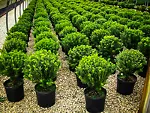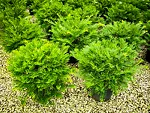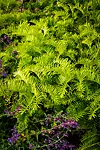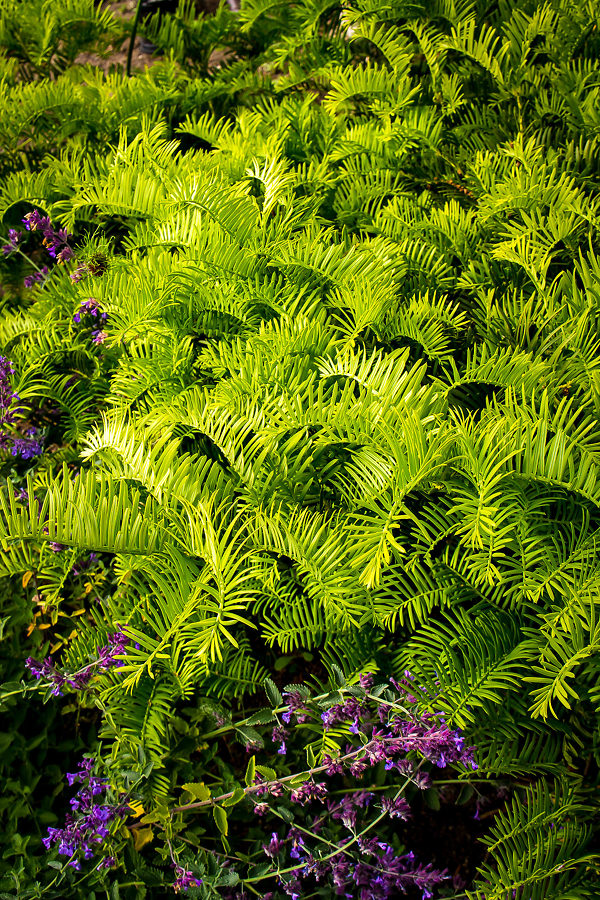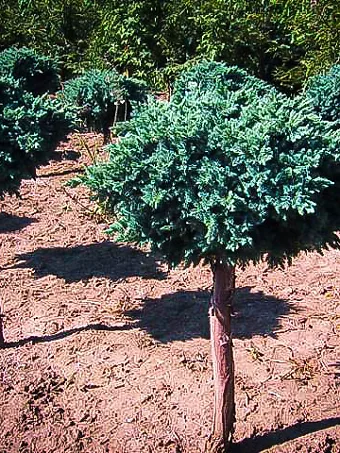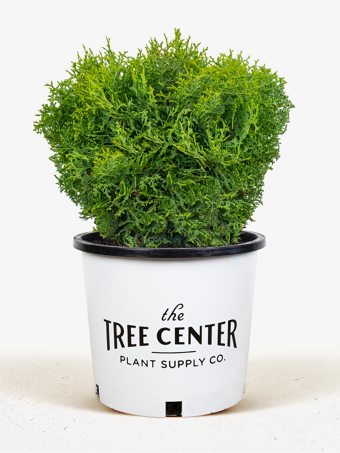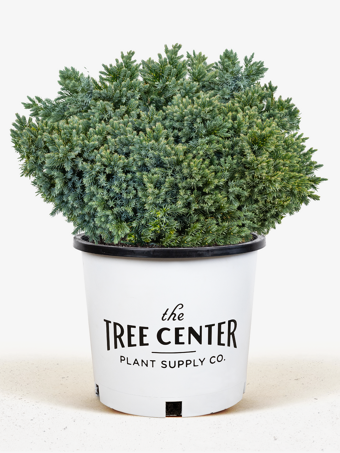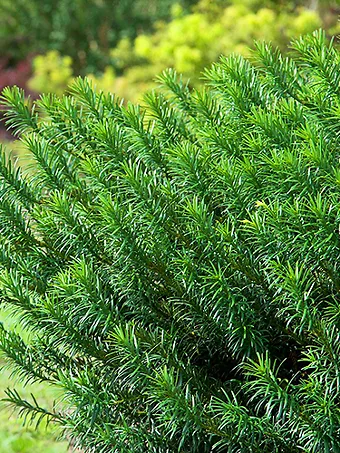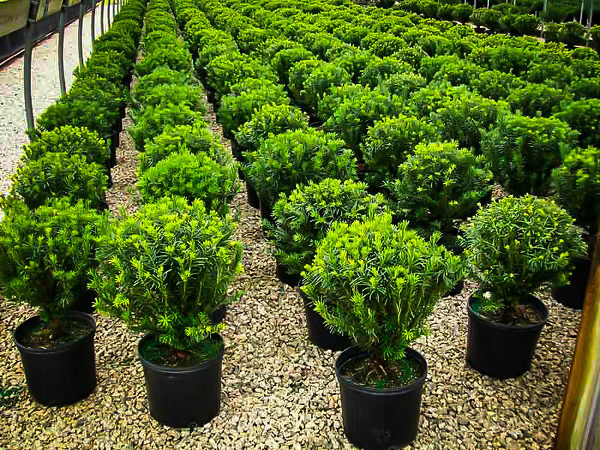
Prostrate Japanese Yew
Taxus cuspidata 'Prostrata'View more from Yew Trees
Prostrate Japanese Yew
Taxus cuspidata 'Prostrata'
30 day - ARRIVE AND THRIVE™ guaranteeLearn more


Special Features

Botanical Name
Taxus cuspidata 'Prostrata'
Outdoor Growing zone
4-8
Mature Height
4
Mature Width
15
Sun needs
Full Sun, Partial Sun, Shade
The Prostrate Japanese Yew is the most reliable evergreen available for those difficult shady spots found in every garden, and it is hardy all through zone 4. It grows in full or partial shade, and in full sun too in cooler zones, but its great value is for those problem areas beneath trees, or on the north side of buildings. It grows at least one foot a year, and it matures into a plant that is only 3 or 4 feet tall, but 10 to 15 feet across. Just a few plants will fill big spaces, with reliable all-year green, making a great backdrop for shade-loving flowers, or filling the areas between other shrubs. It can be easily trimmed, even when mature, and it grows back rapidly even from hard pruning.
- Best choice evergreen for shady parts of your garden
- Fast-growing to 10 feet wide, but just 3 or 4 feet tall
- Rich, deep-green evergreen foliage
- Completely hardy in zone 4
- Grows well in most gardens
The Prostrate Japanese Yew is much more reliable in zone 4 and 5 than the English Yew, so choose it if you live in cold areas. Even in warmer places it is the best fast-growing low yew, ideal as a ground cover, or as a hedge. It grows well in almost all soils, except for areas that are always wet. It can also be grown in planters and containers. It has no serious pests or diseases, and it is reliable, easy to grow, and hardy. The top choice bush for shady places.
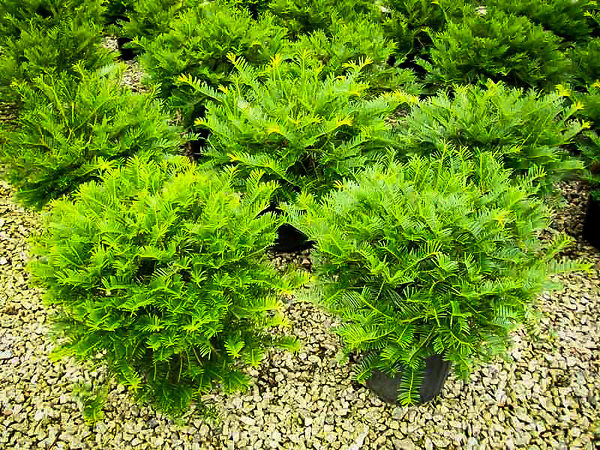
For many gardeners, shade is the biggest problem in their gardens. Finding plants that will grow in it, especially beneath trees, can take up a lot of time – that would be better spent elsewhere in the garden. Rather than struggle to make plants grow where they don’t want to, and ending up with scrawny, unhappy plants, choose instead those that thrive in shady spots, that will fill them with green, and leave you free to garden in the sunnier areas, where there are many more plant choices. To fill those shady areas, and yet stay low so your garden doesn’t become crowded, plant the Prostrate Japanese Yew – you won’t be disappointed.
The Prostrate Japanese Yew grows as much as a foot a year to soon become a wide, spreading evergreen shrub, covering an area up to 15 feet across, yet it rises to only 4 feet tall. After decades plant may become taller, and even wider, but this plant responds very well to pruning and trimming, and you can keep it as neat or as natural as you are wish.
The evergreen foliage is glossy dark green, and it consists of soft, flat needles that are a full inch long, and just ¼ of an inch wide. These are arranged in a spiral around the stems, but as they mature they twist to make two more-or-less parallel rows along the sides of the stem. The needles last on the plant for years, making a dense bush that has a quiet presence and charm. On older plants you may, in spring, see curious greenish clusters along the stems, which open to show yellow flowers without petals. These are male flowers, so the poisonous red seeds seen on some yew trees will not be produced.
Growing Prostrate Japanese Yew
The Prostrate Japanese Yew is a fast-growing and vigorous shrub, adding a foot or more to its spread each year. The new foliage in spring, and after trimming, is bright green, maturing to a rich deep green. This plant is easily trimmed, and even large branches without foliage on them will re-sprout after cutting. This is almost unique among conifer evergreens, which mostly cannot sprout from leafless shoots. So even if you need, at some point, to cut back your plant after it has grown large, this is easily done, and the plant will rapidly regenerate itself.
Uses on Your Property
Use the Prostrate Japanese Yew to fill those awkward areas beneath trees and in shade. This plant thrives and grows vigorously on the north side of your home, or a wall or fence. It will grow well underneath deciduous trees and even in the all-year shade from evergreen trees and bushes. A single plant will fill a large area at least 10 feet across, so a small number of plants can ‘green-up’ even large shady areas. Grow this plant alone for a calm, year-round rich green planting, or interplant with other shade-loving plants like camellias, rhododendrons and azaleas. Use it to create low hedges, and with its rapid, vigorous growth your hedge will be thick and dense in just a few years. For a hedge, plant 3 to 5 feet apart in a row, and trim lightly at least twice a year (in spring and late summer), beginning shortly after planting. Regular trimming will give you a solid, dense and well-branched hedge.
Planting Location
The Prostrate Japanese Yew was made for shade. In nature these plants grow beneath large forest trees, and while it can tolerate dryness in the shade, in similar soil in the sun the leaves can yellow and fall. It will grow well in most soils, except those that are regularly wet. Drier sandy soils, with organic material added, are best of all, but as long as the soil does not remain wet this bush will be happy in your garden. It grows without any winter injury in zone 4, and because of its low form, even in colder areas it often passes the winter safely buried beneath the snow, ready to spring back into action as soon as it melts. It is usually never bothered by pests or diseases and grow happily with minimal care.
History and Origins of the Prostrate Japanese Yew
The Japanese Yew (Taxus cuspidata) is a native tree of Japan, and it also grows wild in Korea, China and eastern Russia. In nature it grows into a tree 30 or 40 feet tall, but in gardens the wild plant is not grown – instead smaller varieties are used. It is similar in appearance to the European Yew (Taxus baccata), but much hardier in winter, so it is the best choice for northern gardens in America.
The variety called ‘Prostrata’ was found some time before 1937, growing as a seedling at the Evergreen Nursery Company, South Wilton, Connecticut. This vigorous plant must be reproduced from stem pieces, not seeds, and our plants are grown from these pieces, becoming sturdy, vigorous plants growing exactly as we have described here. Avoid plants simply called ‘Japanese Yew’, as the final form of these plants will be unpredictable, and they may grow very tall. The demand for this reliable and hardy plant is always high, for its wonderful tolerance of shade, so our stock will not last long. Order now.
